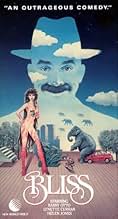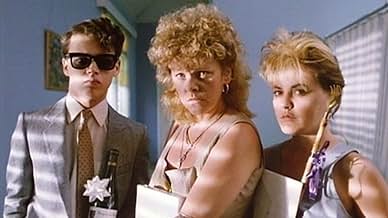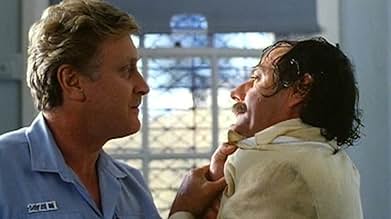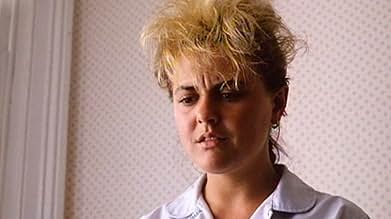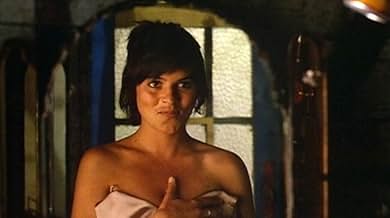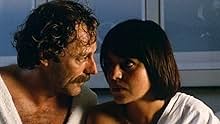Füge eine Handlung in deiner Sprache hinzuAfter a near-death experience, a man wonders if he actually did die and is now in Hell.After a near-death experience, a man wonders if he actually did die and is now in Hell.After a near-death experience, a man wonders if he actually did die and is now in Hell.
- Auszeichnungen
- 4 Gewinne & 11 Nominierungen insgesamt
- Harry's Mother
- (as Sara De Teliga)
- Harry's Daughter
- (as Saski Post)
- Dwarf
- (as Marco Colombani)
Empfohlene Bewertungen
"Harry Joy was a man who liked to tell stories," says the narrator, and this film is full of stories: Histories told through incident, Realities literally warped by perception, Fantasies anchored in Truth, etc. "In New York, there are towers of glass, and the Devil himself drives a big Cadillac Limousine right down Fifth Avenue."
Surreal and enervating, informed by Dante's Inferno and with an ending you never saw coming, this has been one of my very favorite films for sixteen years. It's where I got the name "Mister Joy" ("No, you are NOT Harry Joy, you are MISter Joy.").
Too bad Lester Burnham didn't see it when he was a younger man.
Almost twenty years on, the 'groundbreaking' aspects of Bliss seem tame and quaint, rather like the first episodes of 'Last of the Australians' in which Alwyn Kurts uttered the word 'bastard' on prime time sitcom television. So too, the attention seeking camera-work and 'innovative' narrative treatment strike this viewer as lethargic and unremarkable. The film has been described as 'lauded' but it is worthy of note that at the time it was a box-office disaster, and the industry in general deigned to provide Ray Lawrence with sufficient funds to make another feature until sixteen years later. I know (indeed expect) that many film fans will violently disagree with me, but I welcome (civilised) dissent. Bliss has failed to enhance its reputation with the passing years, but then again I am still of the opinion that Jackson Pollock's paintings are rubbish, and expect to find myself bailed up by the 'cognoscenti' on the cocktail party circuit..
The tone is somewhat dark, the genre surrealist comedy, the performances deliciously eccentric, and the storytelling masterful. "Bliss" reminds me more of some of my favorite novels than it does any other films. Peter Carey's novel and adaptation have some of the feeling of John Irving's earlier works, but it's not derivative. The cinematography is gorgeous and understated. It has a surprisingly romantic core beneath a fairly jaded surface, which I think is a tough combination to pull off.
It isn't appropriate for kids (it has sophisticated, adult themes and, at moments, a very frank approach to sex) and it has an unexpectedly epic, languorous feel toward the end (so don't watch it when you're sleepy), but if you're serious about appreciating movies, you owe it to yourself to give this one a chance. Enjoy!
Enjoy it. A must see.
But at least this is a fault on the right side.
It's as if "Bliss" were a repository, or a central font, of all of the offbeat black humour, all the odd characters, and all the quirky local colour, to have appeared in every Australian film made since. This isn't a bad thing. (My earlier complaint is that its ferociously luxuriant growth could have been cut back by a third and it would STILL have contained all the offbeat black humour, etc.) What makes it great is that it's more sincere than any of its imitators. A mere seventeen years old, it seems to date from a magical, all-but-forgotten pre-digital age, when we REALLY made films, and didn't just play at doing so.
On reflection: I don't care if there IS too much here. So much of it is so good, like the prim, fascist manager of the lunatic ward, the scene in which the cancer map is unveiled (Lawrence makes much out of a mere conversation in a hotel room), and the "love letter" to Honey Barbara. The strength which flows through the film's limbs is probably inherited from the era in which it was made. This decade (from a few years into the 1980s until a few years into the 1990s) saw Australian society at its most optimistic, tolerant and decent. We've come a long way downhill in the short time since.
Wusstest du schon
- WissenswertesWas shown on Australian Broadcasting Corporation (ABC) by John Hind on his film show, and created a mass controversy due to the film's sexual content. The complaints at the time created the most criticised event ever on the ABC.
- Zitate
Adrian Clunes: Y'know Harry, where exactly are you going to draw the line? If you fire us, you have to fire all the clients.
[Oyster flies off his fork]
Adrian Clunes: I'm sorry. Now listen: they release about 18,000 totally new organic compounds every year; none of them are properly tested. God knows how many cause cancer! The whole of the Western world is built on things that cause cancer. They cannot afford to stop making them!
[pause]
Adrian Clunes: Oh, for Christ's sake, look at your clients. Austrol had benzine in petrol; which is a carcinogen. Mitsuzi use it making tires! And we, we use saccharine, and even if we switch to cyclamates instead, they're just another suspect. And that other lot, your dry cleaning companies, use carbon tetrachloride! And every time
[pause]
Adrian Clunes: an announcement is made that something might cause cancer, people are less worried because they cannot believe it possible that half of what they breath and eat
[pause]
Adrian Clunes: is going to kill them.
- Alternative VersionenThe version originally screened at the Cannes Film Festival ran 135 minutes.
- VerbindungenFeatured in Reading Australian Film (1988)
Top-Auswahl
- How long is Bliss?Powered by Alexa
Details
- Erscheinungsdatum
- Herkunftsland
- Sprache
- Auch bekannt als
- Saadet
- Drehorte
- Iron Cove Bridge, Sydney, New South Wales, Australien(Harry driving bent car scene)
- Produktionsfirmen
- Weitere beteiligte Unternehmen bei IMDbPro anzeigen
Box Office
- Budget
- 3.400.000 AU$ (geschätzt)

